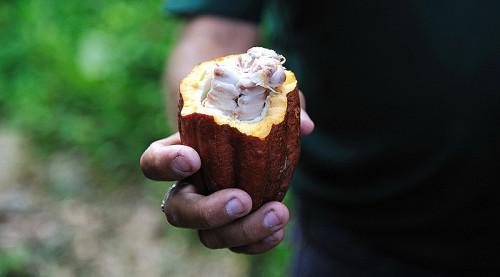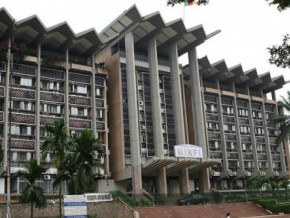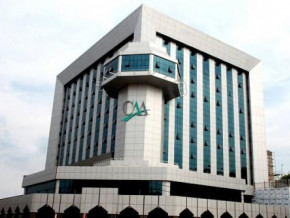
“Researchers at IRAD are working to develop cocoa and coffee varieties which will be more resilient to climate change”

(Business in Cameroon) - In response to a request from Cameroon’s Inter-professional Council for Cocoa and Coffee, this Senior Researcher of the institute of Agricultural Research for Development (IRAD) is presently conducting a study on the effects of climate change on both cocoa and coffee. In this interview, he provides preliminary results that his team got and solutions to challenges associated.
Business in Cameroon: On March 2, 2016, you have officially presented, in a Hotel in Yaoundé, the preliminary results of your study on the impact of climate change on cocoa and coffee production in Cameroon? How did this project come about?
Michel Ndoumbe Nkeng: First, I would like to thank you for the interest you show our study. Everything started with concerns of cocoa and coffee farmers, voiced by the Inter-professional Council for Cocoa and Coffee (CICC). The inter-profession wanted to know what measures to take in face of some challenges they encountered in their farms. These include: hotter weather; longer droughts; irregular rains, arriving either too early or too late, and causing them to no more know when seasons start or end; greater parasite-infestation in orchards; cocoa and coffee tress flowering earlier than expected and then flowers dropping suddenly; same trees which appear to “die” of heat; significant decrease in yield, etc.
These concerns were relayed by CICC to the Institute of Agricultural Research for Development (IRAD). Afterwards, a public-private partnership agreement was signed by CICC and IRAD, and according to this agreement, IRAD was to provide technical expertise while CICC provides funding. So what we had to do was conduct a study to evaluate the effects of climate change on cocoa and coffee production in Cameroon.
To be more specific we were tasked with measuring the challenges that famers across Cameroon’s production basins were referring to; study the curve of climate variables (rains and temperatures) in these basins ; study the impact that these weather variations have on the phenology of cocoa and coffee trees in the basins ; study the relation between climate variables and diseases affecting cocoa and coffee trees, in order to make predictions (modeling).
Work is carried out by a pluridisciplinary team of IRAD’s researchers, assisted by trained observers recruited on each of the sites of the study, as well as CICC officials who deal mostly with the legal and financial aspects of the project.
BC : During your presentation, you said you started the study with a baseline analysis which you called “reference situation”. What major findings did you make in general and at the agro-ecologic level especially?
MNN : Globally, farmers’ concerns were confirmed after the assessment of the reference situation which includes among others, unfavorable weather conditions (long droughts, irregular rains, …). Other findings include the aging of plantations and farmers; archaic cultivation practices for many farmers; inappropriate technical itineraries; insufficient training for farmers.
BC : In terms of methodology, how did the study go on field ?
MNN : First, we proceeded to the meshing of all cocoa and coffee production basins in Cameroon. The two-stage stratified sampling method was then applied, the main strata being the agro-ecological zone and the secondary strata the region. Thirty (30) plots were identified across ten (10) sites where were observed various variables, biologic (yield components, diseases and pests) and climate (rain, minimal and maximal temperatures …).
BC : Your study confirms that weather variations have an impact on Cameroon’s cocoa and coffee production. How exactly does this happen?
MNN : So, what happens is that the trees are water-stressed (a phenomenon which occurs when volume of water evaporating from a plant in any given environment exceeds that which it absorbs), flowers drop abnormally, a great pressure by diseases and pests, all resulting in a significant decrease in yield.
BC : Were you able to find solutions to this phenomenon ? If so, which are they ?
MNN : Works are still ongoing. However, we were able to draw out a few answers. Researchers at IRAD are working to develop cocoa and coffee varieties which will be more resilient to climate change. Data collected during this study will be integrated in modeling frameworks, so that a prediction model for epidemics and an information system (IS) are developed, thus allowing phytosanitary treatments to be given based on a logical procedure. Thing is, we are not there yet.
BC : Cameroon has committed to restart its cocoa-coffee industry by raising cocoa and coffee production to 600,000 tons and 185,000 tons respectively, by 2020. Given your findings, regarding the effects of climate change on productivity, what measures should be implemented to insure that these targets are met?
MNN : Pressing measures to be taken include better agricultural practices, such as using improved existing varieties, a better monitoring of technical itinerary, sanitary harvest, direct phytosanitary treatments to plots. For this, farmers must be supported, both financially and through training also.
BC : Considering the size of your sampling, can your findings be transposed to the whole of Cameroon’s cocoa and coffee production basins, given that weather conditions often vary from one basin to another ?
MNN : It is quite pertinent of you to ask this as it is true that for a better representation of our target zones, the sample size should be way larger. But we must make do with what we have. This research is quite expensive. The more the number of sites, the more it will cost. We must thank the CICC for getting the process started, but also for providing what it promised when it promised to. Steps are being undertaken to establish new partnerships, which should allow us to increase the size of our sample and subsequently, get more precise results.
BC : Finally, referring to your findings, can we conclude that with climate change, cultural practices in agriculture, and in the cocoa and coffee segments especially, will completely change ?
MNN : Let me recall once again that works are ongoing. What we presented are just preliminary results. By the end of the coming year, more precise results of this study will be published and then we will know exactly what we are dealing with. For now however, implementing the above-mentioned solutions should help stop the sharp plunge in yields.
Interview by Brice R. Mbodiam
Mags frontpage
- Most read 7 days
- shared 1 month
- read 1 month






























